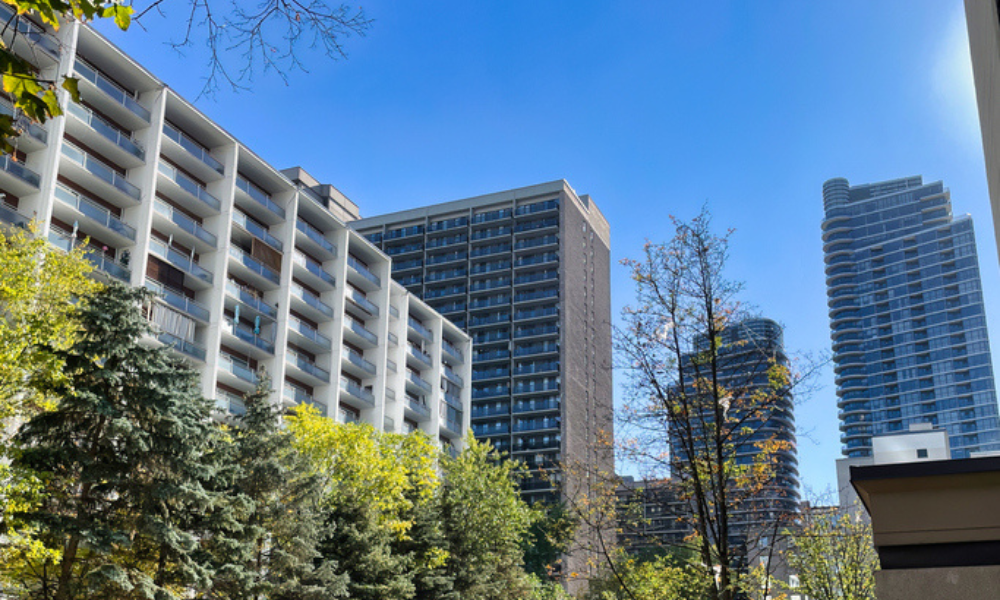GTA condo market has "hit rock bottom," says real estate expert

The Greater Toronto Area (GTA) is seeing an oversupply of condos, driven by record-high completions and high borrowing costs, according to real estate experts.
The combination of these factors has led to more listings than the market can absorb, causing prices to decline as both buyers and investors hesitate.
Condo resales in the GTA dropped 25% in July compared to pre-pandemic levels, according to a recent report by TD economist Rishi Sondhi.
Sondhi attributed this decline to several factors, including a wave of newly completed condos, high borrowing costs making it harder for buyers to close on mortgages, and investors offloading properties due to falling rents and negative cash flow.
“The relatively elevated interest rate backdrop means that the gap between the rate of return from a condo in the GTA... and from a risk-free’ government bond has narrowed,” Sondhi explained in the report. “This may have reduced the incentive to hold a condo as an investment, although the recent drop in yields could be helping to re-widen this spread.”
Supply surge
The numbers highlight just how much new supply is flooding the market. Between January and July of this year, around 19,000 condo units were completed in the GTA – up from 12,000 during the same period in 2023 and 10,000 in 2022.
Brendon Cowans, a sales representative with Property.ca, said the timing couldn’t be worse.
“You can just imagine all of this supply coming in a high-interest rate environment. It’s not a lovely combination,” Cowans told Bloomberg.
Active condo listings in the GTA have jumped 63.9% year-over-year in July, from 5,416 to 8,879, according to real estate firm Zoocasa. The City of Toronto has seen a similar increase, with listings up 61.5% over the same period.
This rise in listings is part of a broader trend across Canada, with cities like Vancouver, Hamilton, Mississauga, and Ottawa all seeing double-digit increases in active condo listings.
Zoocasa's data shows that rising interest rates over the past few years have increased the cost of holding investment properties, particularly for those with variable-rate mortgages.
Cowans pointed out that many investors who purchased condos in the past five years have seen their carrying costs “shoot through the roof,” making it difficult to turn a profit.
As a result, many investors are putting their units up for sale, adding to the growing supply.
“Some of the carrying costs for these properties, especially people who bought within the last five years and were on variable rates, saw the carrying costs shoot through the roof,” Cowans said.
Buyers benefit
For buyers, the oversupply is presenting an opportunity. Zoocasa reported that condo prices across the GTA fell by 2% year-over-year in July, with prices down around 5% since the third quarter of last year, according to Sondhi.
He expects a “gradual recovery” in sales as the market stabilizes but predicts that condo prices could decline by mid-to-high single digits through early next year.
“There are risks to the near-term condo price outlook on both sides,” Sondhi wrote. “On the downside, the wave of condos slated for completion will continue to add to supply. On the upside, condo sales could react more aggressively to falling rates than what we’ve assumed, or investors could yank their properties off the market, tightening conditions at a faster-than-anticipated rate.”
Earlier this month, the Bank of Canada cut its key lending rate by a quarter of a percentage point to 4.25%, marking the third consecutive cut. While the central bank has signalled that it may adjust the pace of rate reductions going forward, there is hope that lower rates could eventually boost demand for condos.
Debbie Cosic, founder and CEO of In2ition Realty, remained optimistic, arguing that the current oversupply is only temporary.
“We’re expecting next year to be a very strong year because we believe interest rates will continue downward,” she said. “We believe the oversupply is coming from the public just standing back to see when the market hits rock bottom. We believe it’s hit rock bottom.”
Cosic encouraged buyers to take advantage of current prices and the incentives being offered by sellers.
The road ahead
The outlook for the condo market remains mixed. While some believe the worst may be over, others caution that the market recovery could take time. Cowans noted that while he expects condo sales to pick up in the coming years as interest rates fall, a rapid recovery is unlikely.
“I do see things picking back up in the future. I don’t expect it to be super fast,” he said. “I can anticipate increases as more rate cuts continue to happen... and in 2027 I just think it’s going to be madness.
Read next: Canada rent growth finally slows as new housing eases pressure
“If people can hold on for the next two years, even three, it’s going to be a drastically different story.”
For now, the GTA’s condo market remains a buyer’s market, with high borrowing costs and record completions creating an environment of oversupply. Whether this leads to a swift recovery or a prolonged period of adjustment will depend largely on the direction of interest rates and how quickly demand returns.
Make sure to get all the latest news to your inbox on Canada’s mortgage and housing markets by signing up for our free daily newsletter here.



